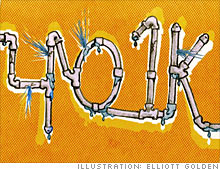How can I keep my retirement plan?
FSB's Anne Fisher reveals how to set up the right solution for your business.

(FORTUNE Small Business) -- Dear FSB: My company supplies irrigation and plumbing materials. Last year I set up a Roth 401(k) plan for my five full-time employees using a major mutual fund firm. Now the firm says that because of a new law, our employees' contributions and employer matching contributions require separate custodians that it is not equipped to provide for us. Some brokerage firms say the same thing. Any ideas?
- Leo Burgunder, President, PVC Supply House, Merritt Island, Fla.
Dear Leo: While there is no new law, says financial advisor Heidi Hutchinson of Hutchinson & Ziegler in San Rafael, Calif., "the Roth 401(k), which was launched a couple of years ago, does have accounting requirements beyond those of a regular 401(k)." Hutchinson says that financial institutions offering the plans may simply find that the added administrative burdens make the Roth 401(k) less profitable to offer to small businesses.
What's the solution? One option, says Hutchinson, is to hire an independent plan administrator to set up your firm's Roth 401(k) and handle its ongoing accounting. To find one, says Earl Sanders, who owns Pension Metrix in San Francisco, search online for "third-party administrators" or consult your CPA for referrals. Annual fees for the service will run you about $1,000 to $2,000, and you can open the account at the brokerage or mutual fund firm of your choice.
Another idea is a simple IRA, which has drawbacks, says Hutchinson. Unlike a 401(k), it requires employers to make matching contributions of 1% to 3% of an employee's pay. These plans also have lower annual deposit limits - $10,500 (with an added $2,500 for workers older than 50), vs. $15,500 ($20,500 for those older than 50) in a 401(k). But, says Kendall Storch of Boston's Longfellow Benefits, "employees who want to save more can salt away the difference in another vehicle, such as a bank IRA." ![]()
Should I raid my IRA to grow my business?
Documentary spotlights looming retirement crisis
Retirement planning for you and your staff
-
The Cheesecake Factory created smaller portions to survive the downturn. Play
-
A breeder of award-winning marijuana seeds is following the money and heading to the U.S. More
-
Most small businesses die within five years, but Amish businesses have a survival rate north of 90%. More
-
The 10 most popular franchise brands over the past decade -- and their failure rates. More
-
These firms are the last left in America making iconic products now in their twilight. More








